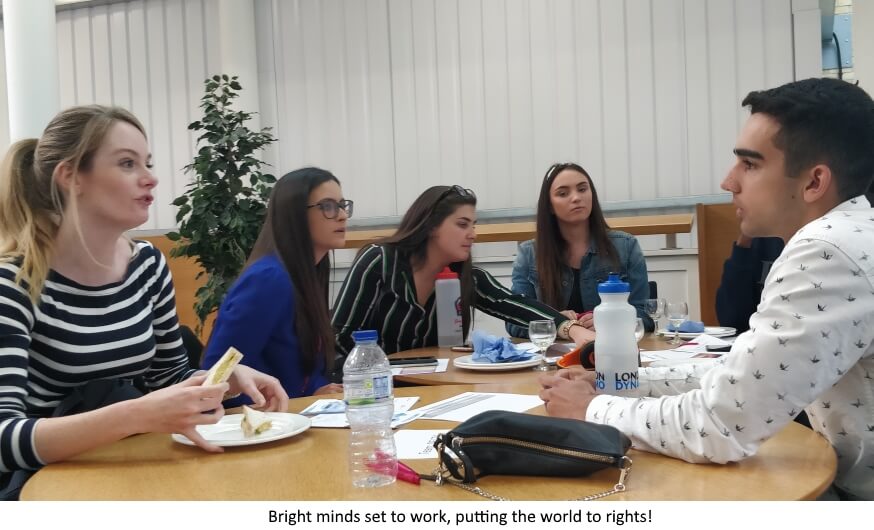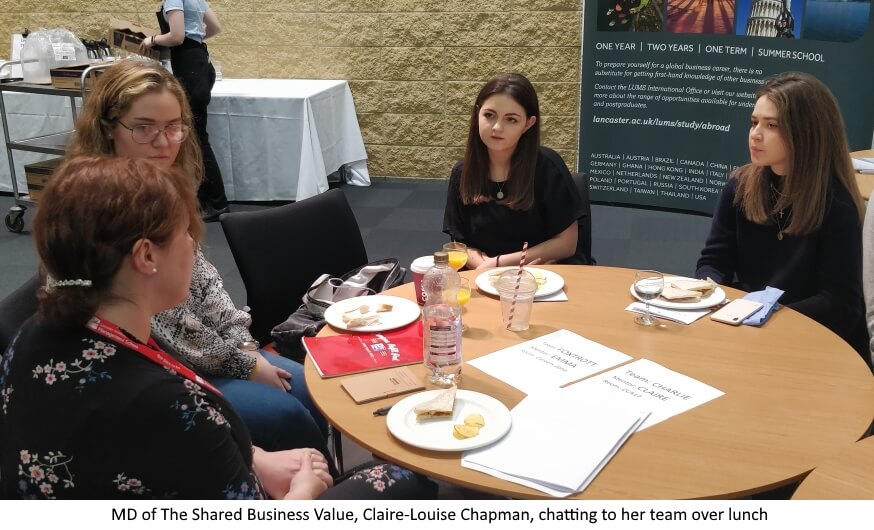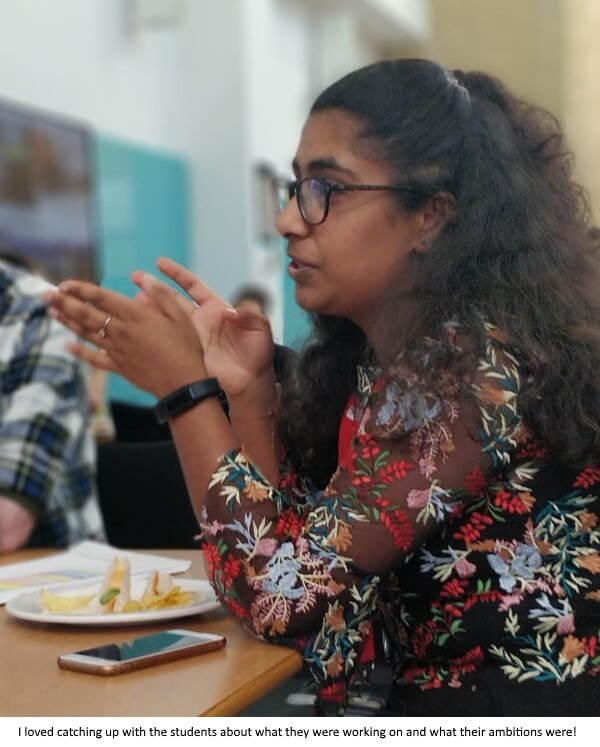As the world continues to become more affluent and the global middle-class begins to grow, more people are looking to travel for leisure, for education and for work. Conversely, as our economy becomes more globalised, we increasingly rely on goods transported via air from the furthest corners of the world, in order to satisfy our wildest demands. Commercial and industrial airlines evidently benefit from the eightfold increase in flights over the last forty years, but air quality, human health and living conditions are set to significantly worsen.
Given our current climate emergency, how do we even begin to address such a big polluter when flight has become so ingrained in our culture, society and economy? A difficult, complex and multilayered situation that the Pentland Centre for Sustainability in Business set a group of first-year Marketing students to wrestle with. Insights to the challenge and current solutions were presented by Dr Alison Stowell, Associate Director for the Centre, and Sharlene Gandhi, their Champion and advocate. Armed with the information that a Boeing 737-400 plane emits 90 kilograms of carbon dioxide per hour, and that roughly 4.5 billion people flew on 45 million scheduled flight departures[SA(1] , six groups of students, each mentored by marketing professionals and Lancaster alumni, set out to solve the problem.
Those in the room were no strangers to flying, and many had relied on the aviation industry to allow them to attend Lancaster University Management School. Students noted that they had become accustomed to flying, as if it had become the norm, like taking a train with slightly more logistical inconvenience. Vicky Metcalf, Marketing Careers Coach and organiser of the ‘Marketing Me’ event, worked at Heathrow for ten years - she admits being ecstatic to hear the news about the third runway, realising shortly after what the environmental implications of that really are!
The ideas that emerged from the students were incredible, all with the aim of inciting behavioural change amongst a particular offending audience, whether that was leisure travellers, academic staff or business leaders. All the groups and their mentors were worthy of praise, but three groups in particular stood out to The Pentland Centre representatives, who judged alongside Helen Chaffey (Careers Coach in the Marketing Department and former advertising industry insider at the likes of Saatchi & Saatchi - no stranger to the jetsetter lifestyle!), and Emma Allison (Head of Marketing and Operations at Forward Role, where our winners will be spending a day).

Team Echo, led by Sony Electronics placement student Daniel Middendorf, targeted senior business management and HR leaders with their campaign - “Is Your Business Meeting Really Worth It?” Taking the motif of showing the environmental impact of flights through the equivalent number of plastic bags, Team Echo - Evelina Kempele, Carrie-Anne Auckland, Molly Fliege, Grace Christian-Welcome, Dianjun Qi and Nina Yu - aimed to use a shock factor to compel business and HR leadership to change company policies on business travel, which is one of the primary contributors to the aviation industry. Additional to the visualised comparison between flying and plastic pollution, the team suggested sending personalised letters to senior management in large companies in order to hit the message home. Grace, a member of Team Echo, had been inspired by events earlier in the day, such as listening to the brief and the alumni; according to the event itself “helped to spark the process [to] design the idea to pitch to the judges.”
Team Alpha took a drastically different approach, with their idea “Below The Clouds”. Led by Olly Heron of Microsoft and Abbie Lawton of Social Republic, Team Alpha, comprised of Ines Pedro, Freya Oxton-Grant, Zoe Foster, Natasha Stowe, Alexandra Blagu, Sara Mitov and Monib Firoozpoor, targeted their campaign towards leisure travellers. Instead of flying everywhere, the team argued that leisure travellers needed to reframe their definition of a vacation, appreciating the journey just as much as the destination. With a wonderful app design to accompany their pitch, the team highlighted how alternative means of travel, could quite literally be enjoyed below the clouds. The app would also incorporate discounts on local and sustainable shopping such as to incite and continue this behaviour. The team focused on rail travel as an alternative to flying - as team member Natasha Stowe told me, “since lots of [the team] went travelling and Interrail-ing over the summer, [they] tried to think of an app that [they] would use.”
The winners of the day, Team FlyNeutral, came to the table with an idea that questioned the wider culture of travelling and how travellers could quite literally offset the impact that they would be having when flying. Zekia Salmon-Hall, Millie Beaney, Olivia Snow, Oonagh Clapham, Hannah Shelton, Olivia Humphrey and Calum Laing, led by Claire-Louise Chapman, MD of The Shared Business Value, shared the following narrative: imagine an individual book’s a flight, for business or personal reasons. More often than not, this is something that is done in advance. So, the individual who has made the booking is then told how much their flight will emit in terms of greenhouse gases, and they have the opportunity to offset these emissions until the day of their departure. This, the team suggested, can be done by buying groceries locally, recycling, or purchasing second-hand goods. This attention to detail, situating flying in a wider issue of disposal and pollution, was what caught the judges’ collective eye. Oonagh Chapman mentioned that Alison Stowell’s briefing presentation included one fact about the amount of carbon dioxide emitted by laptops and other devices, and that was what set the FlyNeutral team thinking about carbon offsets. The team also stood out for their coherent and cohesive presentation, backed up by Calum Laing, who mentioned the value of “bouncing ideas off one another and [using] the group dynamic to offer improvements to the original app suggestion.”

These ideas not only show amazing potential to be implemented in reality, but also an acute awareness of what it means to have such a polluting industry at the centre of our working and leisure culture today. All of the ideas balanced creativity with intelligent awareness of the target customer, and some even went the extra mile to include points about data and metrics in their pitches - which, as we know, is vital to the success of modern marketing.
“Thank you to all the teams for their enthusiasm in producing such creative and innovative ideas to tackle the global climate crisis, and thank you to Vicky Metcalf and the LUMS Careers Team for allowing The Pentland Centre to have access to such brilliant minds!” said Alison Stowell.

An honorary mention goes to the following students for participating in the day and approaching the challenge with care and imagination: Ian Chan, Benson Kwa, Ella Dobrowolska, Becky Lynch, Tobias Dahlhaus, Tobi Abolarin, Nathanael Amouzou, Lydia Thomson, Paulius Juozapavicius, Frances Copeman, Jasmine Hawkridge, Patrick Gilbertson, Finn Whelan, Olanta Harding, Sam Williams, Yulin Liu, Chengcheng Li, Baqir Datoo, Amber Howard, Chris Hill, Kathryn Odrich-Damalie and Nisha Benzynie.

